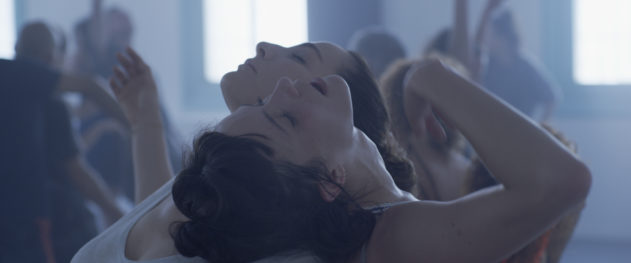In conversation with the creator and cast of “LOSING ALICE,” airing today on Apple TV +
The Apple TV+ series “Losing Alice” fashions an atmosphere of dread in its first moments and never lets up. Over eight episodes this Israeli import, which debuts stateside on Friday, is more about engendering a feeling within the viewer rather than setting up a who-did-what-when thriller procedural.
Not that the staples of the mystery genre aren’t present. But unlike lesser shows, which start with a crime and work backwards to its committer, “Losing Alice” teases us in that nothing truly illegal, or even illicit, perhaps happens until several hours into the show. And yet we, as viewers, remain constantly on edge thanks to the outstanding work of writer-director Sigal Avin.
“It starts with the writing, to make sure each character [inhabits] this world and has the things she/he needs/wants,” Avin said on a conference call last week. “As you get older you see there are certain things about [people] that are never going to change. They’ll try certain things and they always fall into the same” traps and fall victim to their own flaws, she said.
“Losing Alice” stars Ayelet Zurer as Alice, a middle-aged filmmaker who largely left behind making movies to teach and become a mother. She is married to David (Gal Toren), one of Israel’s most famous movie stars. One day while on a commuter train, Alice is chatted up by the young Sophie (Lihi Kornowski), a wannabe screenwriter who also happens to be a fan of Alice’s films.
Why hasn’t Alice directed in many years, Sophie wants to know. And Sophie believes she has the perfect script to lure Alice back behind the camera—with David in one of the main roles.
“Alice made a few movies in her youth that really inspired Sophie, and I think she made a lot of sexually open movies which Sophie admires,” said Kornowski, who portrays Sophie. “So, she becomes obsessed with Alice and thinks that Alice is the only one who can direct the film in the specific way she wants it.”
From there, reality and fiction teasingly blur as the film within the film is occasionally seen. Brief visions of something violent and horrible are also shown, but the viewer is unsure if what we see is inside the movie or “really” happening to the characters.
“Welcome to the mindfuck world of ‘Alice,’” laughed Toren, the actor who plays David. “We had to be reminded a lot of times who we were playing” at certain points of the story or the story-within-a-story. “It’s tied together in such a weird and twisted [way].”
Twisted doesn’t even begin to cover the sexual dynamics of the show. David cannot help but be drawn to Sophie, but so, in a strange way, is Alice.
“It was very interesting dealing with eroticism in this era,” Avin said. “And the more open you were about it and the more rehearsals we did […] gave the actors safety and more space to play within.”
I asked Toren and Kornowski if their style of acting differed for the film-within-a-film. Toren responded that it was both a challenge and a gift to be able to portray characters who are also actors like himself—while acting no less.
“Not every day do you get to show your profession [from the] inside. Even if you do act as an actor, usually you don’t feel the film that you’re making,” he said, adding that the film-within-a-film was fascinating as the overall story told in “Losing Alice.”
On a similar score, I asked Zurer, who plays Alice, and show creator Avin about how they approached making scenes where Alice watches many young actresses auditioning to play Sophie’s avatar in their fictional film. At one point, Alice even walks past a parade of aspiring actresses there to read for the leading lady; Zurer said she vividly recollects attending similar cattle call auditions in her own acting career.
“When you’re a young actress you [show up] in your little black dress and think you’re going to be special. You come to the audition and there’re twenty beautiful females just like yourself,” she said, calling it an often “unkind experience.”
However, Avin’s writing and directing also showed empathy to those waiting to audition, which Zurer said she greatly appreciated. And when it “works,” with actors finding the right chemistry with one another, a certain magic is unleashed.
“I couldn’t find Alice, and when Ayelete came into the roll she clicked with the character immediately,” Avin said of her lead.
Zurer was working in the U.S. when she got the scripts for “Losing Alice.” Over the internet she and Avin had several conversations about Alice’s emotional states, as well as her levels of deception with both herself and with other characters.
“I read Sigal’s scripts so many times. I started finding [that] there’s a lot of little lies sprinkled all over the screenplay,” Zurer said. “Little lies [Alice] tells herself and lies she tells other people, and it really showed me where she is emotionally and where she wants to be emotionally.
“We agreed it was a slippery slope journey rather than one moment of ‘bang.’ There was a lot of conversation about how we feel as women.”
Kornowski believes that the show would have been much different had it been envisioned and directed by a man. And as Avin is simultaneously spinning a mysterious yarn, she is also exploring the dynamics of interpersonal female relationships, both the positive and negative.
“Sigal wants to put a light on fear of aging, women’s ambition and the complex relationship women have with each other and themselves,” Kornowski said, adding that a male director could not capture this dynamic so thoroughly. “Sigal’s female point of view was very important to make the whole series [successful].”
Toren added that he was in awe of the female empowerment aspect of “Losing Alice,” even if much of that ambition was often put towards darker ends for the characters.
“It’s a real mixture of a very strong thriller-inside-a-household-relationship kind of disaster,” said Toren. “All that mixture makes it something that I think is very important.”
“And also it’s very sexy.”
“Losing Alice” will be available on Apple TV+ starting today.
news via inbox
Nulla turp dis cursus. Integer liberos euismod pretium faucibua




